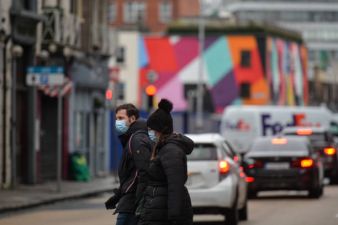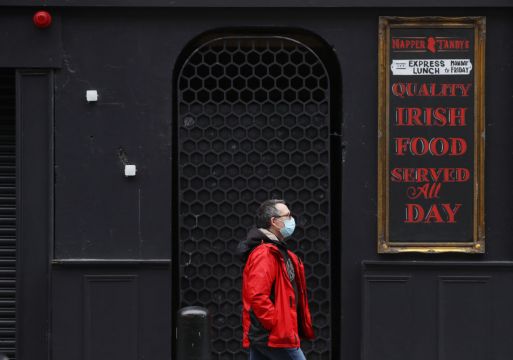The term “zero Covid” has grown increasingly popular as Ireland battles a third surge of the coronavirus.
With the Republic currently facing a Level 5 lockdown until at least March 5th, followed by various levels of restrictions until herd immunity is reached through vaccinations, we take a look at the strategy.
What is zero Covid?
A strategy of zero Covid involves the complete elimination of community transmission of the virus, before restrictions can be lifted and life can return to “normal”.
This would see the complete reopening of society and the economy — from schools to workplaces to mass gatherings — provided there are strict controls in place to prevent the virus re-entering the community, such as quarantine facilities for travellers.
It contrasts with the current Government strategy of “Living with Covid-19” which aims to suppress the virus through restrictions and lockdowns rather than eliminate it, and lifts restrictions as case numbers lower.
New Zealand has become somewhat of a posterchild for the strategy during the pandemic, however, it is important to note that there are not zero cases of Covid-19 on its island — they are just contained within the rooms of the country’s quarantine hotels.
Who is calling for zero Covid in Ireland?
The main group behind a call for a zero Covid strategy in Ireland is the Independent Scientific Advocacy Group (ISAG) — a group of academics and doctors from both sides of the Border.
The campaign group has said that alternatives to Ireland's strategy of lockdowns have not been given “serious consideration”, and has called for the country to become a European leader in managing the virus.
But vaccines are on the way — so what’s the point?
According to the ISAG, vaccine-based population immunity will not become a reality until late 2021 at the earliest — meaning Ireland is set to continue cycling through various stages of restrictions for the foreseeable future.
The group has thus far made very accurate predictions. In August, member Professor Ivan Perry, Dean of Public Health at UCC, said the country was “sleep-walking towards a major surge of infections in October - November.”
In mid-December, member Professor of Health Systems at DCU Anthony Staines warned that Covid-19 cases would continue to rise “steadily over Christmas” leading to potential “yo-yo lockdowns” in January and beyond.
So how would a zero Covid strategy work in Ireland?
The ISAG has previously set out an “exit strategy” for the pandemic in Ireland, which would see the following happen:
- Continue with strict lockdown restrictions until community cases reach a low enough level — likely until around the end of April. Defined areas would then open up as they get to zero cases.
- Quarantine all incoming international travel to Ireland in hotels, in order to prevent new seeding of the virus in the community.
- Manage movement within Ireland to prevent infections spreading from one county to another. “Travel bubbles” or a system or permits could be established at boundaries between two counties, including those either side of the Border, to allow daily commuters to go about their normal business.
- Continue to prevent infections using hand hygiene, ventilation, social distancing and mask wearing.
- Continue to test, trace and isolate with the provision of better resources for regional public health units. Each case that emerges must be dealt with like a “murder,” with swift and thorough contact tracing and testing to nip outbreaks in the bud.
- Roll back the above measures geographically as counties reach very low numbers of cases. If two or more counties reach very low levels of cases, they could form a common “bubble” with free travel. Eventually, all of Ireland will reach that stage, and only international travel will be controlled.
- Support those required to isolate or live under restrictions, with consistent economic support provided for sectors forced to temporarily close and no financial or job security penalty for those who have to isolate.
The group has said it would not be necessary to seal Ireland off from the rest of the world to achieve zero Covid. The strategy would not mean there would be zero cases of the virus on the island, but rather that there would be no cases arising in the community from unknown sources.
What about the border shared with Northern Ireland?
The ISAG has said it is not advocating for the closure of the Border, but rather “close working” with Northern Ireland's government to benefit both jurisdictions.
Dr Gabriel Scally, a group member and president of epidemiology and public health at the Royal Society of Medicine in London, has said that ending the pandemic on the island requires politicians of the same calibre as those who ended the Troubles.
Another member, associate professor in Geography at University College Dublin Julien Mercille, said outbreaks in Border counties could be managed through specific checkpoints and zones.
Outbreaks would be contained within a “red zone” surrounded by Garda checkpoints, which would then be surrounded by buffer zones, and finally a “sentinel” zone where Covid-19 infections would be measured to see if cases were spreading beyond the red zone.
Under this plan, trucks and trade would continue with designated truck stops so truckers do not interact too much with other people when south of the Border.
Who else is on board with the strategy?
Opposition politicians have become more vocal regarding their support for a zero Covid strategy in recent months.
People Before Profit’s Richard Boyd Barrett has called for the Government to implement the approach in a bid to “save summer”.
Some Government TDs have now also urged Ministers to look at adopting the strategy, including Green Party TD Neasa Hourigan and Fianna Fáil’s Christopher O’Sullivan.
Professor of biochemistry at Trinity College Dublin, Luke O’Neill, has also said that science supports the strategy — but cautioned it was very difficult to achieve.
What about the Government?
Both the Taoiseach Micheál Martin and Tánaiste Leo Varadkar have rejected suggestions of pursuing a zero Covid strategy in Ireland.
Mr Martin previously insisted that the Government cannot deliver a strategy to eliminate the virus in the Republic, due to its shared border with Northern Ireland.
Mr Varadkar has said that the National Public Health Emergency Team (Nphet)’s advice was that the strategy “wouldn’t work” in an Irish context, due to its close proximity to Europe and connection to the UK with the Northern Irish Border.
What do Nphet think?
Public health officials from Nphet have rejected a zero Covid strategy as impractical and “risky” in the Republic.
Professor Philip Nolan, chair of Nphet’s epidemiological modelling advisory group, said proponents of the strategy had made “false promises” that an end to lockdowns could be achieved “in the space of weeks or months.”

He added that the strategy was “incredibly risky” as Ireland would “inevitably be a leaky country and get reintroduction of disease" — including new and more transmissible variants.
According to chief medical officer Dr Tony Holohan, the strategy would be very difficult to apply “in a realistic way in an environment like ours”.
Ireland is a small economy dependent on its links with Europe and “we simply couldn’t realistically seal the borders of this country and stop people moving in and out”, he said.
Chief executive of the HSE Paul Reid has echoed Nphet's reservations, saying he did not believe it was possible to lock the virus out of the country.







